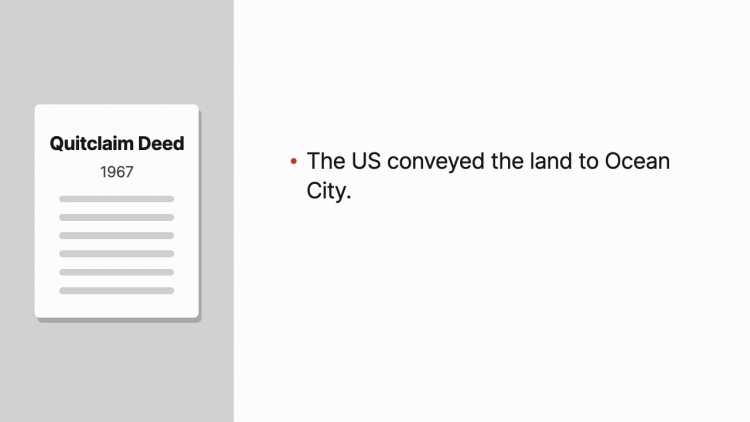Mayor and City Council of Ocean City v. Taber
Maryland Court of Appeals
367 A.2d 1233 (1977)

- Written by Eric Cervone, LLM
Facts
In 1869, Stephen Taber acquired title to the land that later became Ocean City, Maryland. In 1878, Taber conveyed one of his lots to the United States government. The deed stated that the lot was to be used for a “Life Saving Station” only. The deed said once the lot was no longer used for a Life Saving Station, the lot “shall, without any legal proceedings, suit or otherwise” return to Taber and his heirs. In 1967, the United States issued a deed quitclaiming the lot to Ocean City (defendant). The quitclaim deed noted the land was no longer being used for a Life Saving Station. In 1971, Taber’s heirs (plaintiffs) sued Ocean City, arguing that when the land had ceased being used for the Life Saving Station, ownership of the land automatically reverted back to the heirs. Under this theory, the heirs were entitled to the land. However, Ocean City argued that the 1878 deed was invalid. Under this theory, the United States had occupied the land without a valid deed for almost 100 years, ultimately acquiring fee-simple ownership of the land through adverse possession. This would mean the United States had full ownership, which it rightfully transferred to Ocean City through the quitclaim deed. The trial court ruled in favor of the heirs. Ocean City appealed.
Rule of Law
Issue
Holding and Reasoning (Orth, J.)
What to do next…
Here's why 907,000 law students have relied on our case briefs:
- Written by law professors and practitioners, not other law students. 47,100 briefs, keyed to 996 casebooks. Top-notch customer support.
- The right amount of information, includes the facts, issues, rule of law, holding and reasoning, and any concurrences and dissents.
- Access in your classes, works on your mobile and tablet. Massive library of related video lessons and high quality multiple-choice questions.
- Easy to use, uniform format for every case brief. Written in plain English, not in legalese. Our briefs summarize and simplify; they don’t just repeat the court’s language.





